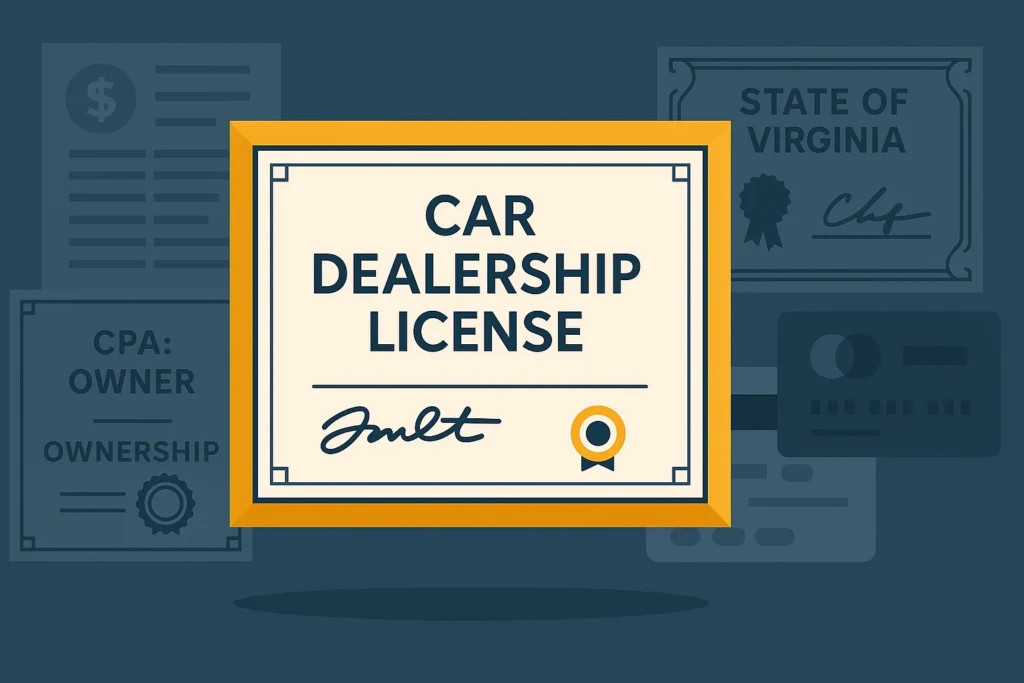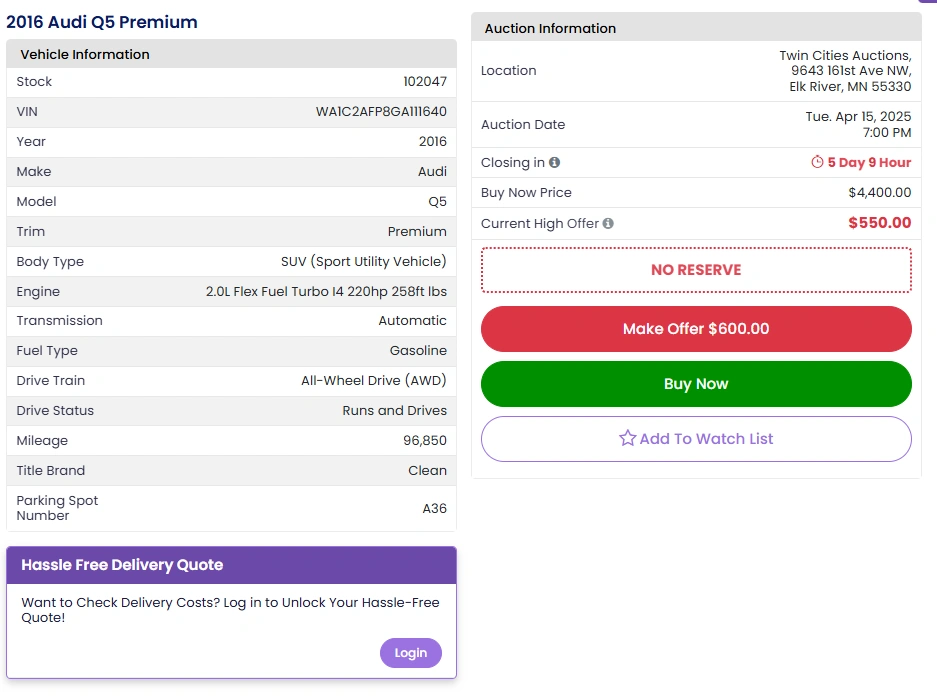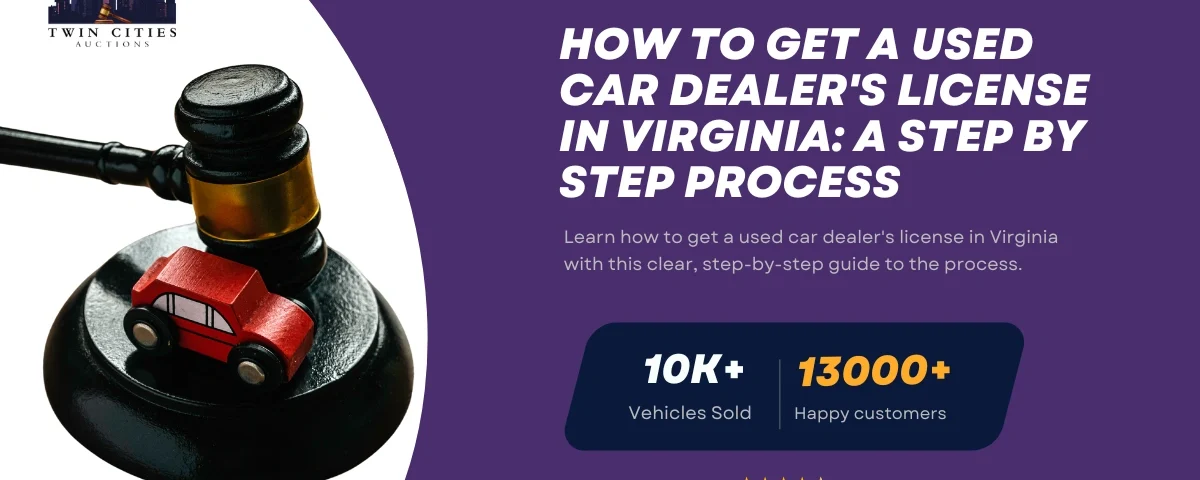Are you thinking of starting a used car dealership in Virginia? Understanding the state’s regulations is essential for operating legally and successfully.
In Virginia, you can sell up to five vehicles per year without a dealer’s license. Once you exceed that limit, you must obtain a used car dealer’s license.
This guide will walk you through each step of obtaining a dealer’s license, explain the different types of licenses, and show you how to source vehicles effectively for your dealership.

Key Takeaways
- In Virginia, you can sell up to five vehicles per year without needing a dealer’s license. Selling six or more vehicles in a year requires obtaining a used car dealer’s license.
- Virginia offers various dealer licenses, including Used Car Dealer, Wholesale Dealer, and Auction Dealer licenses, each with different requirements.
- To qualify for a dealer’s license, you must have a permanent business location, complete a pre-licensing course, pass an exam, and meet other state requirements.
- Auctions like Twin Cities Auctions offer an affordable way to acquire inventory for your dealership.
Step-by-Step Process to Obtain a Used Car Dealer’s License in Virginia
Step 1: Choose the Right Type of License
Virginia offers several types of dealer licenses. Each is designed for different business models and operations:
| License Type | Description |
| Used Car Dealer License | Allows you to sell used vehicles to the public. |
| Wholesale Dealer License | Permits you to sell vehicles only to other licensed dealers. |
| Auto Auction Dealer License | Authorizes you to operate a vehicle auction business. |
| Finance Dealer License | Enables you to offer financing for vehicle sales, including in-house financing options. |
For most individuals aiming to sell used cars to the public, the Used Car Dealer License is the appropriate choice.
Step 2: Meet the Basic Requirements
To qualify for a used car dealer’s license in Virginia, you need to meet several basic requirements:
| Requirement | Description |
| Business Location | You must have a permanent, non-residential business location that complies with local zoning laws. |
| Business Entity | Your dealership must be a legal entity, such as an LLC or corporation. |
| Surety Bond | You must obtain a $50,000 auto dealer bond to operate legally in Virginia. |
| Insurance | You must provide proof of liability insurance for each dealer plate issued. |
| Criminal Background Check | You need to submit to a criminal history check. Felony convictions related to fraud or dishonesty may disqualify you. |
Step 3: Complete the Dealer Application
Once you meet the basic requirements, you will need to complete the Dealer License Application form. This can be done through the Virginia Department of Motor Vehicles (DMV) website. You will need to provide:
- Your business name and address
- Proof of your legal business entity
- Proof that your business location complies with local zoning laws
- A list of business partners or officers, if applicable
Step 4: Submit Required Documents
Along with your completed application, submit the following documents to support your application:
| Document | Description |
| Certificate of Zoning Compliance | To confirm that your business location complies with local zoning laws. |
| Criminal History Check Data Form | This form is to be processed by the DMV for background verification. |
| Dealer Plate Application | For obtaining dealer plates. |
| Application for Certificate of Qualification/Salesperson’s License | Required for operating as a dealer. |
Once your documents are submitted, the DMV will review your application.
Step 5: Pass the Dealer Exam
Virginia requires first-time used car dealers to pass a Dealer Exam. The exam is designed to ensure you are familiar with the state’s motor vehicle laws, including vehicle title transfers, warranties, and consumer protection regulations.
Before you take the exam, you must complete a two-day Dealer-Operator Pre-Licensing Course, which is available through the Virginia Independent Automobile Dealers Association (VIADA) or the Virginia Community College System.
Step 6: Business Operations and Compliance
Once you’ve passed the dealer exam and submitted your application, it’s crucial to ensure ongoing compliance with Virginia’s motor vehicle laws. This includes maintaining accurate records and complying with advertising laws.
Keep Accurate Records
As a licensed used car dealer in Virginia, you must keep detailed records of:
- Sales records of vehicles sold
- Customer contracts and financing agreements
- Vehicle title transfers
These records must be available for inspection by the DMV or law enforcement upon request.
Comply with Advertising and Consumer Protection Laws
Virginia enforces strict regulations on how you advertise and sell vehicles. You must ensure that all advertisements are truthful and provide customers with necessary disclosures, such as:
- Vehicle history (for used cars)
- Warranty information (if applicable)
- Sale price and financing terms
Failure to comply with these regulations could lead to fines or the revocation of your dealer’s license.
Step 7: Pay Fees and Obtain Your License
After completing all required steps, you will need to pay the necessary licensing fees. These fees may vary depending on the type of license you are applying for. For example:
| Fee Type | Amount |
| Dealer License Application | $200 – $300 (depending on business type) |
| Dealer Plates | $75 per plate |
| Criminal Background Check Fee | $15 – $25 per applicant |
Once your fees are processed and your application is approved, you will receive your used car dealer’s license.
Why Auctions Are a Smart Choice for Vehicle Sales
When you’re building your inventory, using auctions can be a smart choice for sourcing vehicles. Twin Cities Auctions, based in Minnesota, is one such reputable auction house that offers a wide range of vehicles at competitive prices.
Key Benefits of Buying from Auctions:
- Wide Selection: Auctions like Twin Cities Auctions offer a variety of vehicles, from low-budget cars to high-end models.

- Competitive Pricing: Auctions often offer vehicles at prices below retail value, enabling dealers to maximize their profit margins.

- Transparency: Auctions provide full vehicle history reports, so you know exactly what you’re buying.

- Convenient Bidding: Many auctions offer online bidding for your convenience, making it easier to source vehicles without being physically present.
Twin Cities Auctions: A Smart Vehicle Sourcing Choice
For those in the automotive industry, Twin Cities Auctions offers an excellent platform for sourcing quality vehicles at competitive prices.
Whether you are just starting or expanding your business, this auction house provides transparency, competitive pricing, and a broad selection.
| Feature | Description |
| Inventory Variety | Wide range of cars, trucks, and SUVs available |
| Competitive Pricing | Below-market pricing allows for higher profit margins |
| Vehicle History Reports | Detailed history reports for every vehicle |
| Online Bidding | Convenient online bidding options for dealers |
| Financing Options | Financing available to help with inventory purchases |
Practical Tips for Sellers and Dealers
To ensure the success of your dealership, here are some practical tips to consider:
Know Your Market
Understanding local demand is essential. Research customer preferences in your area, whether it’s SUVs, sedans, or trucks. Tailoring your inventory to match local preferences can drive sales.
Provide Financing Options
Offering financing can significantly increase sales, as many buyers prefer to finance their vehicles. Partner with banks, credit unions, or offer in-house financing to attract more customers.
Maintain a Strong Online Presence
Build a professional website and stay active on social media to boost your dealership’s visibility. Use SEO techniques and online advertising to attract more potential buyers.
Conclusion
Getting a used car dealer’s license in Virginia is a crucial step in starting your dealership. By following the steps outlined above, you’ll ensure you meet all legal requirements. Additionally, sourcing inventory through auctions like Twin Cities Auctions can help you build a diverse and cost-effective inventory.
Twin Cities Auctions: No Dealer License? No Problem!
Are you interested in buying or selling a car but worried about the complexities of needing a dealer license? Worry no more! At Twin Cities Auctions, we’ve removed the barriers, making our auctions open to everyone.
Whether you’re a seasoned buyer or a first-time seller, our platform offers a welcoming environment where you can participate freely. Experience the ease and excitement of our next auction and discover just how simple and rewarding a car auction can be!
Looking for more options? Explore our comprehensive list of all available car auctions across the United States. Your next deal might be just a click away!
FAQ
What is the maximum number of vehicles you can sell without a dealer’s license in Virginia?
In Virginia, you can sell up to five vehicles per year without needing a dealer’s license. If you sell more than five vehicles in a year, you must obtain a used car dealer’s license.
How much does a used car dealer’s license cost in Virginia?
The total cost for a used car dealer’s license in Virginia varies, depending on the type of license and other factors. Refer to the Virginia DMV’s fee schedule for current fees.
Do I need a physical location to sell cars in Virginia?
Yes, your business must have a physical location that complies with local zoning laws. The location must be dedicated to vehicle sales.
How do I prepare for the Virginia dealer exam?
You must complete the required pre-licensing course and study Virginia’s motor vehicle laws, including title transfers, warranties, and consumer protection regulations.
What is a surety bond, and do I need one?
A surety bond is a financial guarantee that protects consumers if the dealership fails to meet its obligations. Yes, you will need to secure a $50,000 auto dealer bond to operate legally.
Can I sell cars at an auction without a dealer’s license in Virginia?
No, a dealer’s license is required to participate in vehicle auctions in Virginia, whether buying or selling cars.
What are the business location requirements for a used car dealership?
Your dealership must have a physical location that complies with local zoning laws, is not a residence, and has space to display at least 10 vehicles.
Why should I use auto auctions to source vehicles?
Auto auctions provide a cost-effective way to purchase a variety of vehicles, allowing you to diversify your inventory at competitive prices.
Source Links
https://www.dmv.virginia.gov/businesses/dealer-services
https://www.dmv.virginia.gov/businesses/dealer-services/licensing
https://www.dmv.virginia.gov/forms
https://www.dmv.virginia.gov/businesses/dealer-services/exam-requirements
https://law.lis.virginia.gov/vacode/title46.2/chapter15
https://www.suretybonds.com/states/virginia/auto-dealer-bond


